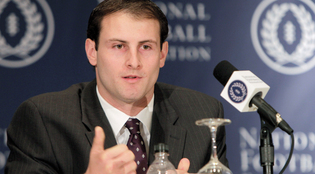 loading
loading
featuresA Rhodes Scholar reactsThe endorsement process should balance the interests of the university with those of its applicants. Ariel David Adesnik ’99, who studied international relations at Oxford as a Rhodes Scholar, is now a defense analyst in Washington, DC.  NYTimes.comThe recent controversy surrounding Yale quarterback Patrick Witt ’12 may lead Yale to reexamine its process for Rhodes Scholarship endorsements. View full image
Someone decided to tell the Rhodes Trust that Patrick Witt ’12 had been accused of sexual assault. Perhaps that someone will now step forward to take responsibility for his or her actions. Perhaps not. Presumably, the informer believed that he or she was acting in the name of justice. Yet regardless of intentions, Yale now has a problem. The more obvious problem Yale faces is a matter of public relations. The more subtle problem is how to balance the privacy of students who apply for fellowships, graduate programs, and jobs with the right of selection panels, admissions offices, and employers to obtain relevant information about their applicants. What we know right now is that the university cannot prevent an anonymous individual with a grievance from disrupting a student’s post-graduate plans. But Yale does recognize that the Witt debacle has called its applications process into question. When I asked President Levin about the situation, he responded via e-mail that Mary Miller ’81PhD, the dean of Yale College, is putting together a committee “to review our processes for nominating candidates for external awards such as the Rhodes and Marshall Scholarships.” If Miller approves the committee’s recommendations, the changes will be made before the process begins again next fall. The nomination process is significant because students cannot apply for a Rhodes or Marshall (or a Mitchell Scholarship, for study in Ireland) without the endorsement of their college. In effect, the national scholarship boards deputize institutions of higher education to conduct an initial screening on their behalf. At Yale, students submit their application materials to the Fellowship Programs office in late August: application forms, essays, lists of activities, four letters of recommendation, and a report from the dean of one’s residential college. Some of those applicants are selected for interviews in early September with panels of Yale faculty and administrators; each panel interviews six to eight students and selects which of them to endorse. There is no cap on the number of endorsements, but universities are expected to impose high standards. Once endorsed, students proceed to the national selection process, which is administered by the scholarships themselves. At present, there is a single question on Yale’s application regarding past infractions: “Do you have a Yale disciplinary record?” Given that Yale defines informal complaints as “non-disciplinary,” Patrick Witt would not have been obliged to disclose the allegation of sexual assault, even had he known about it in August when he applied. Nor did Witt have to disclose that he had an arrest record—run-ins with the police in both Nebraska and New Haven. Yale has not said whether its selection committee knew of Witt’s involvement in the 2010 altercation outside Toad’s that resulted in his fine for creating a public disturbance; or of the Nebraska arrest, also for a minor infraction. Witt’s agent told the New York Times that the quarterback disclosed his Nebraska arrest to Yale before arriving on campus, but there is no reason to think the selection panel would have been told of it. In theory, Witt’s residential college dean would have known about the New Haven arrest; the deans know the disciplinary records of students in their colleges. “Deans should advise a student against applying for certain scholarships,” says Jill Cutler, a former assistant Yale College dean who served on numerous Rhodes panels at Yale, “if the student’s disciplinary record shows they don’t have the appropriate character.” Do these arrests represent two nights gone wrong, or precisely the sort of information that enables a committee to assess whether a candidate meets the Rhodes criteria for “moral force of character”? In Nebraska, the charges were dropped after Witt completed a diversion program; in New Haven, he paid a $90 fine. Is such information sufficiently reliable and meaningful to serve as a basis for evaluation? Arguably, it has no value beyond the prejudicial. From the perspective of due process, there is a strong case to be made for the current application system. But Yale must ask whether it can afford to be blindsided again. When it convenes, Miller’s committee will face the difficult task of defining an approach to endorsements that balances the interests of the university with those of the applicants. The committee may want to request from the Rhodes Trust national guidelines on both arrest records and information derived from social media. In hindsight, it may seem striking that Yale’s selection process treated disciplinary issues in such a cursory manner. Yet experience never suggested a need for additional probing: Cutler told me that no similar incident arose in all her years of involvement with the process. Nonetheless, anomalous cases expose the limits of a system. Perhaps the silver lining is that Yale now has the opportunity to set a precedent for colleges across the country by designing a more fair and thorough process for endorsements.
The comment period has expired.
|
|